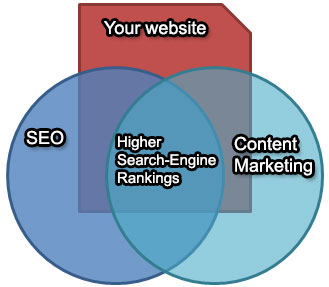
SEO content writer guidelines
You can find thousands of content writers on the Internet vying for your business and some of them are actually brilliant.
But your business website, or even your blog, doesn’t just need a content writer, it needs a content writer that can take care of your SEO needs.
What am I talking about?
The performance of your content writer can be gauged from the following two indicators:
- How much search engine traffic your content attracts.
- How much of that traffic actually converts.
Successful content writers know how to draw a balance between both the requirements.
What does an SEO content writer do?

What does an SEO content writer do
An SEO content writer writes search engine friendly content but more than that, he writes content that helps your visitors.
What does Google want to do? Does it want to crawl, index and rank your content or does it want to provide the best possible information to its search engine users?
It’s a mix of both.
It wants to provide the best possible information for the search being done.
The information cannot be found unless Google crawls, indexes and ranks your content (or content from other websites and Internet sources).
An SEO content writer knows what Google wants, from the inside out.
He knows that the content quality and the content relevance triumphs everything else.
Then, when quality and relevance are taken care of, the SEO content writer focuses on the keyword optimization aspect of your content.
Does he need to be a better writer? Obviously. He should be a great writer. He should be a great copywriter. He should be able to write convincingly and engagingly.
Your SEO content writer must also know how to format and organize your content in such a manner that Google can easily make sense of it.
Can any writer achieve that? Not without experience.
There are millions of webpages and blog posts on the Internet.
And when there are millions of webpages and blog posts to compete with, only the subtle things, things that cannot be directly observed by the eye, can make a big difference.
Hence, an SEO content writer
- Develops a complete understanding of your topic/subject before beginning to write.
- Completely understands what your audience is looking for.
- Writes your content impeccably.
- Knows where to use your keywords and where not to use them.
- Knows how to organize your content under various sections so that it’s easier for search engines to make sense of it.
- Write simple yet professional sentences that are easier to interpret both for search engine algorithms as well as human readers.
Does an SEO content writer just write content to improve search engine rankings?
It depends on in what capacity your SEO content writer is working with you. An experienced SEO content writer like me can provide both consulting as well as writing.
What does consulting mean? It means advising you with the topics that you must cover to improve your search engine rankings.
The sort of topics that you choose to cover is as important as writing the content itself. To create content that genuinely improves your search engine rankings you must know what information people are looking for and then write content accordingly.
You should also be able to write and publish unique information. Preferably, information that is not existing anywhere else. The more unique your information is, the better are going to be your search engine rankings.
The conversion rate of your content is as important as your search engine rankings. In fact, if you enjoy higher search engine rankings but your conversion rate is low, your rankings are of no use.
Hence, an SEO content writer must also be a good copywriter because only then he is going to be able to convince your visitors into turning your paying customers and clients.
Does an SEO content writer really improve your search engine rankings?
Well, this is the intention of working with an SEO content writer – your search engine rankings must experience a significant improvement once optimized content begins to appear on your website/blog on an ongoing basis.
“On an ongoing basis” is the key here. Publishing SEO content on your website or blog is not a one-time affair. Just like you continuously need to host your website, you continuously need to publish content.
The reason is, all your competitors are continuously publishing SEO content. They all want to outdo each other. Every competitor who is ranked below you, wants to rank above you, and he or she is not going to rest unless that objective is achieved.
Hence, you need to outdo his or her effort and for that, you need to publish SEO content on an ongoing basis.
Hence, provided
- Your content writer is well-versed with writing SEO content.
- You publish content regularly at set intervals.
- You focus on publishing high-quality content that delivers value.
Your SEO content writer is definitely going to improve your search engine rankings.
Your SEO content writer must strike a balance between higher search engine rankings and conversion rate

Balance between SEO and conversion rate
Your website needs targeted traffic from all over the web in general, and search engines in particular.
After that, it isn’t just search engine traffic that does the job, you also need business, you need paying customers and clients.
When I say content writers, I mean people who totally understand the need of a business to convert traffic into customers and clients.
Add SEO abilities and you have the killer combination. So here are a few SEO guidelines for content writers that may help you as a content writer, and as also as a business owner looking for an SEO-proficient content writer.
- Write for the target audience
- Use the language your target audience uses on day-to-day basis as well as on search engines
- Avoid using more than two keywords for a webpage, an article or a blog post
- Stick to the main topic and try to remain as vertical as possible
- Be original; search engines like Google dislike duplicate content
- Use the primary keyword in the title
- Write for your audience first, make sure your content is convincing and would convert well, and only then think about SEO
- Use your primary as well as longtail keyword in the description
- Write in a conversational style
- Use appropriate images whenever possible because this can get you extra traffic from image searches as well as social networking websites like Pinterest
- Solve a problem, or provide a solution
- Use primary keywords and longtail keywords within headline tags (for instance, <h1>, <h2>, etc.)
While preparing content for these SEO guidelines for content writers I discovered that lots of points that I have mentioned above already exist, or rather, appear in regurgitated form on other websites. Since the language is almost similar it shows that most of these writers don’t actually understand what it takes to create SEO-friendly content that also converts well, and they have simply taken the content off other websites and blogs. Some have even copied the bulleted lists straightaway. Well, this is the first sign that shows that where you stand.
Why SEO guidelines for content writers
Every good, experienced content writer by default is also a good SEO content writer.
Amidst daily professional and personal grinds we forget these points so it is always better to keep revising them on a regular basis so that they get embedded into our subconscious. For instance, creating a title that contains the primary keyword should be done as a usability benefit even if you are not specifically writing for SEO. Similarly, highlighting important point with the help of the main keywords helps your readers quickly understand the gist of your webpage or the blog post.






